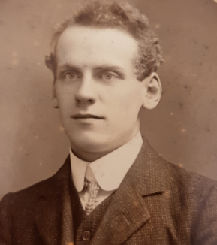Name
John Henry Whiting Dorrell
Conflict
First World War
Date of Death / Age
02/06/1918
31
Rank, Service Number & Service Details
Pioneer
210762
Royal Engineers
Signal Sub. Section
Awards: Service Medals/Honour Awards
Cemetery/Memorial: Name/Reference/Country
BIENVILLERS MILITARY CEMETERY
XXI. A. 9.
France
Headstone Inscription
Not Researched
UK & Other Memorials
Not on the Hitchin memorials
Pre War
John ‘Jack’ Dorrell was born in Mortlake, West London to John and Carrie Dorrell.
In 1891 John would have been about 4, but the family has not yet been found in the census, his father was a Postman who died of Tuberculosis when Jack was ten (about 1897). He was brought up by his mother and stepfather, a gardener and in 1901 Carrie and John's stepfather, William Croft, were living at Hanwell House Lodge, Sheen Road, North Sheen, Surrey, Hitchin. William was working as a domestic gardener. The children present were: John Dorrell (14) and his sister Cissie Dorrell aged 12.
By 1911 John was lodging at 35 Fitzgerald Avenue, Mortlake and working as Civil Servant 2nd Divn Clerk. Amy Roberts was the other lodger listed, who John later married.
After school he joined the Civil Service which in Edwardian times offered opportunities for improvement by means of taking Civil Service exams. He passed Pitman’s shorthand and typing exams at a time when secretarial work was a male employment.
He married Amy Roberts in 1912. His wedding certificate records his occupation as ‘Second Division Clerk GPO’. At the outbreak of war, Amy was pregnant; their son John was born in March 1915. He did not, as a result, join the rush to sign up for service at the outbreak of war.
Wartime Service
John attested under the Derby scheme in December 1915 and was mobilised in May 1916 as a signaller in the Royal Engineers.
In 1915, the Royal Engineers Signal Service training centre was established in Bedfordshire and North Herts. The Headquarters was in Bedford with Depots in Hitchin, Stevenage, Baldock, Biggleswade and Dunstable.
After basic training at Bedford and signal training at Dunstable, he was transferred to the Hitchin Depot based at Bearton Road in February 1916. Hitchin was the unit preparing troops for draft for overseas service and during this period he was prepared for life on the Western Front. New equipment, rifles and gas masks were issued and training for gas alert was given. He embarked for France on 18th Mach 1916 from Southampton and landed at Rouen to begin his war.
In France Jack underwent further advanced training for three weeks prior to drafting to the 31st Division near Arras. His first experience of the Western Front was a Signaller in an Infantry Brigade Headquarters. His duties as a signaller consisted both of signalling and as a ‘linesman’. In the latter role he was expected to mend broken signal lines, damaged usually as a result of shellfire. As his diary entry for 3rd May 1917 records “Big straffing stunt commenced at 3.45. Ruddy awkward at 4am. Out as linesman at 4.25. Hart 'very windy’, repaired one quad then doubled back to headquarters - Left me to follow at Leisure”.
After six weeks he developed a flu-like illness, and, as a result of Trench Fever. Trench fever was a louse born infection which affected between a fifth and a third of British soldiers between 1915 and 1918. It caused a high fever that normally resolved in five days. However, as in Jack’s case, it could be more prolonged and as a result he was transferred back to England.
After convalescence he returned to the signal depot in Biggleswade in July 1917 where he found ‘a cushy number’ as a billeting clerk, being promoted to Acting Lance Corporal (paid). His response was ‘such is greatness!’.
He remained in this post until 25th April 1918 when, after the German Spring Offensive, he was told at 11pm that he was to embark to France the following morning for further active service.
After a five-day refresher course in France, he was posted to an artillery Brigade Headquarters near Arras. His role, as before, was as a signaller and linesman. In an extract from his last letter to his mother he wrote, referring to his wife and son visiting relatives in Somerset “I suspect they will be in the west all summer, If that happens, if ought to do them a world of good and thoroughly set them up for winter. It is a long time to anticipate though and we must go slow. Lots of things may happen before the end of the summer. There is one thing above all others I am sure we should all like to think would happen and that this wretched business would be over and we would be back home again but there doesn't seem to be much prospect of that”.
On the same day he recorded that he relieved Corporal Stevens as duty signaller. Two days later both he and Corporal Stevens were killed, believe to be mending lines and today they lie side by side in Bienvillers Military Cemetery. Jack was 31 years old at the time of his death.
After his death, Jack’s bloodstained wallet and shrapnel damaged photograph album were returned to his widow.
Biography
Additional Information
His biography also appears at Herts At War Archive
Acknowledgments
Dan Hill



